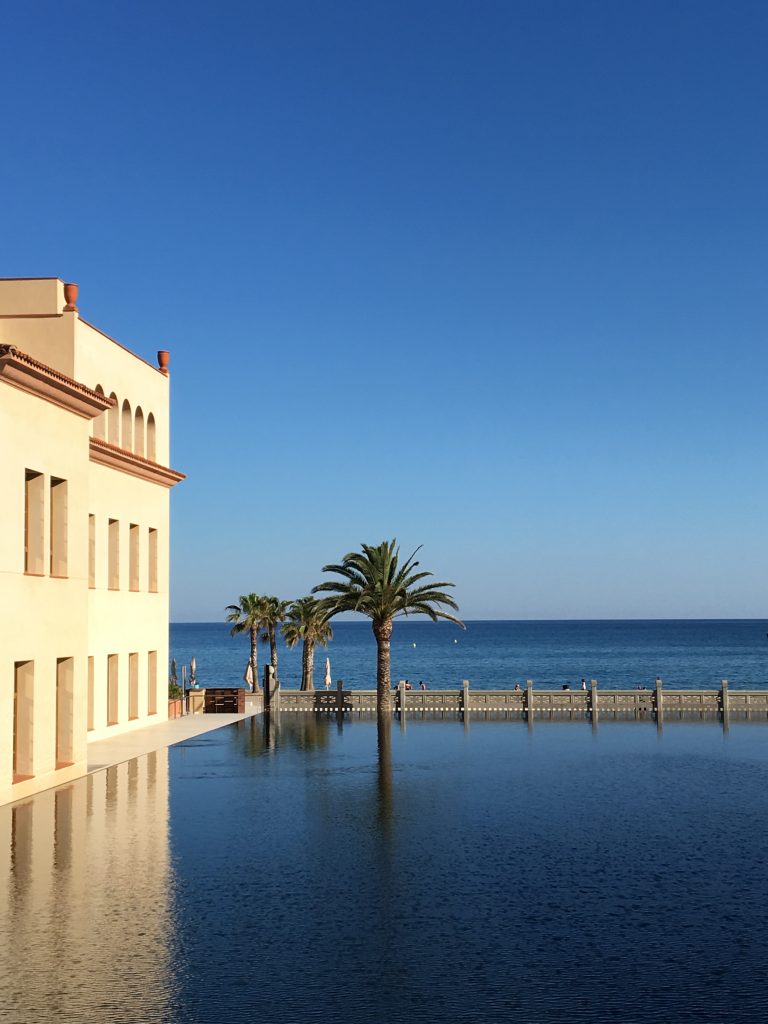
You might be wondering why I’m writing about travel right now. For heaven’s sake, we’re in the middle of a pandemic!
It doesn’t mean a girl can’t dream… or plan ahead.
This pandemic won’t last forever. I do expect it to last long into 2021 as vaccines are finally developed and fully tested, manufactured, and delivered across the globe.
My prediction is that to stay healthy we have another year of strict social distancing protocols.
While this doesn’t necessarily mean that we won’t be traveling in 2021, it’s unlikely that we’ll travel very far.
So, why are we already planning our next trip?
We know that in order to save money on travel, we need to plan in advance. That’s why we’ve already started planning our vacation for next summer.
What We’re Planning for Next Summer
This summer we had the opportunity to go camping a few times. Out in the woods, separated from other campsites, we felt the weight of the pandemic lift as we were able to walk around without masks. Note: We did put them back on when we went into the communal bathroom or walked along narrow trails.
While we love camping, it’s something that’s easier to do for a long weekend. It’s also a lot of work to set-up a teardown camp, so we tend to stay in one place each time we go.
Here’s what we’ve decided. Next summer, we’re going to rent a (pet-friendly) campervan so that we can camp and explore Maine, Vermont, and New Hampshire. If Canada’s border is open to Americans (I doubt they will be), we could also decide to explore Quebec.
How You Can Save Money on Travel by Planning Ahead
In order for this (or any other trip) to be affordable, we need to plan ahead. The biggest three travel costs – accommodation, transportation, and food – are also our biggest three expenses generally. If we plan ahead, we are able to cut costs significantly.
In this post, I’m going to share a few ways we are planning ahead to make next summer’s campervan trip more affordable.
I understand that #vanlife, even for a short trip, may not be for everyone. So, I’ll provide examples of how to make travel more affordable for other types of trips as well.
How to Save Money on Transportation
There are many ways to reduce transportation costs. Most of them involve planning ahead!
1. Stay Close to Home
One way to reduce transportation costs is to plan a vacation close to home. If you cut out the cost of a flight, a vacation becomes much less expensive.
Since we don’t thinking we’ll feel ready to fly in mid-2021, we’re planning to rent a campervan locally.
With a campervan (or another type of RV), transportation costs are included with your accommodation. You don’t need to rent another vehicle.
We are choosing to rent a campervan through Outdoorsy, which is like Airbnb for RVs. Owners choose to rent their RVs when they aren’t using them through Outdoorsy. We have seen that it’s quite a bit cheaper to rent a campervan through this service than through specialized companies that rent RVs or campervans.
*Get $50 off your first booking with Outdoorsy! If you use our refer-a-friend link, we’ll also get a small bonus from it.
As part of the rental, we will have 100 miles/day included. If we drive more than 100 miles/day, only then will we need to pay an additional surcharge to cover mileage. This means that our only transportation costs will be to drive to pick up the campervan and the gas to fill up the tank.
There are only a few nice (and affordable) campervans in our area on Outdoorsy. We want to plan ahead to make sure they don’t get booked!
Even if you don’t want to rent an RV, there are still ways you can take a vacation close to home. Earlier this summer, we drove 4 hours to stay in a cabin up in Maine for a week.
I’d encourage you to think about places within 4-5 hours of driving that you might want to visit. Sometimes, it can be hard to see our “own backyard” as exciting, but I’m sure people come to visit these places often. It’s fun to see familiar places with new eyes.
2. Reduce the Cost of Air Travel with Special Deals or Travel Rewards
There are many options we have to reduce the costs of air travel, once we are ready to fly again.
One thing that we’ve written about significantly is travel hacking. This is when you use credit card rewards (most often from lucrative sign-up bonuses) to fund travel. Some of these credit cards are associated with a particular airline. Others, such as Chase Sapphire Preferred, allow you to transfer points to multiple different airlines. They also allow you to book flights through their own travel portal.
*You can open a Chase Sapphire Preferred Card today with its highest-ever sign-up bonus of 80,000 points! That’s worth over $1,000 in travel credit if you book through the Chase Ultimate Rewards Portal. It could be worth even more if you transfer points to hotels or airline partners. If you use our refer-a-friend link, we’ll also get a small bonus from it.
When we went to Panama in 2019, we covered the cost of two round trip tickets with the sign-up bonus from an American Airlines credit card. When we visited Europe in 2017, we booked flights on TAP Portugal through the Chase Ultimate Rewards Portal. Since TAP is a very inexpensive airline, we used fewer points than if we had transferred them to another airline. We also keep a lot of JetBlue points on hand for traveling domestically, since JetBlue is one of our local airline hubs.
If using travel rewards is not an option for you (or if you didn’t have enough time to accumulate them), there are a few other options to help you reduce your costs. One recommendation is to be flexible with our travel dates. Sometimes moving a flight by a single day will provide hundreds of dollars in savings.
Whenever we need to buy flights, we also like to use a website called Hopper. This website uses a complex algorithm to tell you when the optimal time to buy the ticket will be.
3. Minimize Costs on Ground Transportation
If you are traveling somewhere and did not rent a vehicle, taking a cab or an uber everywhere can get quite expensive. One idea is to use travel rewards to rent a car. We booked a rental car through the Chase Ultimate Rewards portal for one leg of our Panama trip. It worked out really well for us.
Other options include using public transportation, renting bicycles or electric scooters, or walking. There are so many creative options popping up.
When we were in Europe in 2017, we traveled around Paris using the subway. We traveled between cities on high-speed trains. In Geneva and Barcelona, we even rented bikes to explore the cities.
In Washington DC last fall, we rented electric scooters (unlocking them with an app on our phone) for an afternoon to explore the monuments.
How to Save Money on Accommodations
There are so many options to save money on accommodations as well. If you do your research and book early, you can often get the best deals.
1. Stay in Non-Traditional Accommodations
Hotels can be quite expensive, depending on where you go. We’ve found that staying in nontraditional accommodations, like an Airbnb, camping, or renting an RV can cut travel costs significantly.
While renting a campervan next summer is somewhat more expensive than camping or renting an Airbnb, we’re super excited about it. It’ll allow us to travel around easily from place to place. We’ll get to sate our wanderlust without setting up and breaking down camp every day. It’ll also provide us with a kitchen where we can cook most of our meals.
We also love staying in Airbnbs when we travel. We’ve stayed in Airbnbs in San Francisco, Portland, ME, Panama, Paris, Barcelona, and many other places. We’re often able to find places close to the city center that are much cheaper than hotels in the same areas. Being in the city center allows us to be able to walk, bike, or take public transportation more often to explore a city.
*Get up to $50 on your first Airbnb stay* If you use our refer-a-friend link, we’ll also get a small bonus from it.
Sometimes, there will also be local vacation rentals where you go as well. We’ve rented cabins in Maine for many years from local agencies.
2. Use Travel Rewards
Similar to air travel, you can often use travel rewards to book hotels. Some hotel chains have their own credit cards, or you can book them using general points from Chase, Citi, or Amex. Another option is to book accommodation using a card like the CapitalOne Venture Card that allows you to erase travel purchases using points.
*Earn up to 100,000 bonus miles with Capital One’s Newest Offer! This is equivalent to $1,000 in travel credit. If you use our refer-a-friend link, we’ll also get a small bonus from it.
This past summer, when we rented the cabin in Maine, we erased about $600 from the cost by using our CapitalOne Venture points. This was the only way to “travel hack” this cost because we booked the cabin through a local agency.
Another less-known option is that some credit cards will allow you to exchange points for Airbnb gift cards. When we went to Europe, we chose to do that because the hotels in the city center were 25,000+ points per night. We could book an Airbnb for ~$100-150, which was the equivalent of 10,000-15,000 points when we traded it in for gift cards. While some people say that’s a bad redemption, it was worth it to us.
We typically stay in non-traditional accommodations when we travel. Because of this, we usually don’t prioritize credit cards that are affiliated with hotel chains.

Sometimes, we’ll splurge and stay somewhere really nice with points that we wouldn’t otherwise pay for with cash. For example, we also used travel rewards to stay for free at this beautiful resort on the southern coast of Spain near Barcelona.
3. Use Discount Accommodations Websites
Sometimes you can find cheaper accommodations using sites like Hotels.com or Priceline. One downside is that these sites don’t allow you to earn points for future stays.
The other issue is that Priceline’s best deals don’t tell you the name of the hotel until after booking. You choose how much you want to spend, and you are matched with a hotel in the area. This leaves a lot out of your control.
How to Save Money on Food and Drink
When we go on vacation, we definitely enjoy eating out. Even in non-COVID times, we never enjoyed eating out for every meal.
Here are a few ways we’ve save money on food and beverages:
- Stay somewhere with a kitchen: When you have a kitchen, you have the opportunity to make your own meals part of the time. So often, we find that we prefer to make our own breakfast and lunch. It’s much healthier, and we don’t feel sick of restaurant food by the end of the vacation. If we are camping or staying in a cabin, we will typically cook dinner as well.
- Buy simple foods from a grocery store: Even if you don’t have a kitchen in your accommodation, you can buy simple foods to minimize eating out. For example, when we were in Europe, we bought cheese, meats, crackers, bread, and fruit at a grocery store to have a picnic lunch in a local park. We’ll sometimes bring granola bars for breakfast, so we don’t have to go out and find breakfast.
- Find accommodation that includes breakfast: When we went to Panama in 2019, every accommodation except for one included breakfast. I hate having to wake up in the morning and figure out where I want to go and eat. I’d much rather eat an included breakfast at a hotel or bring something quick and easy.
- Find restaurants frequented by locals: When traveling, touristy restaurants are usually the most obvious and the most expensive. For example, in Panama, we made the mistake of not eating lunch before arriving at the Panama Canal Locks Site. This location has one restaurant that has a lunch buffet for $35/person. Once we arrived though, it was our only option because we found out we’d need to wait 2-3 hours before a ship would come through. To make up for this experience, we did find some local gems on our trip to Panama. Near our hotel, we found a local taco place in our neighborhood. There wasn’t a tourist in sight, and we got a full meal for 2 for ~$15.
- Bring a reusable water bottle: If you need to buy water out when you are exploring, it can get expensive. We always bring our own reusable water bottles that we can fill up at our accommodations. If we are in a country that doesn’t have potable water, we’ll usually go to a corner store and buy large containers of water to refill our bottles. This is always a lot cheaper than buying small bottles of water.
Spend Lavishly on Activities After You’ve Cut Costs on the Big Three (Transportation, Accommodation, and Food)
The best thing about saving money on travel with transportation, accommodation, and food is that we can spend more to enjoy sites and do fun activities.

This doesn’t mean we aren’t thoughtful about what we do, it just means that we feel good about spending money on things we value.
Because of this, we’ve splurged on things like zipline tours, snorkeling, tours of or admission to historical sights, wine tasting, bike tours, kayak rentals, etc. We’ve even been on a Moose Safari up in Maine.
One thing that we like to do is to book excursions with a local company, rather than the hotel, where possible. These tours are often cheaper and more authentic, and they have the added benefit of investing in the local community.
Planning Ahead Can Make a Vacation Even More Enjoyable
I was surprised to learn that anticipatory joy can sometimes be even more pleasurable than the actual experience. I can definitely see how this would relate to planning a vacation. When we spend time planning ahead and anticipating the experience, we can find even more enjoyment.
One reason I love working part-time is that I have time to plan ahead without feeling stressed. This allows me to cultivate anticipatory joy related to the experience. This is also one reason why I love planning trips during the dark days of fall and winter (and especially now during a pandemic).
While we can’t always plan ahead as much as we’d like to, it’s important to know that it doesn’t just make financial sense. It also helps us to enjoy the experience even more.
Is it time to start planning your next vacation? Even if you plan a low-cost, local vacation, the process of planning could bring you a lot of joy!



























It is definitely time to plan a vacation, even if the wait will be longer than usual.
Anticipating fun joyful things will get us through the winter!!
I agree. You can learn a lot of things when you plan ahead! Defining where you want to go sets a goal to work toward. A lot of people talk vaguely about travel. They never say where they are going, just that they are going. Picking a destination is immensely important, as it gives you a definite goal.